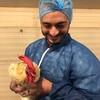Explore all the information on
Coccidiosis in poultry
Coccidiosis is a protozoal disease causing diarrhea, ,weight loss and decreased production in poultry. It can be fatal. Prevention is key and is achieved with use of anticoccidials or vaccination. Diagnosis is by fecal flotation to detect oocysts, often in combination with characteristic necropsy findings. Coccidiosis is caused by protozoa of the phylum Apicomplexa, family Eimeriidae. Most species affecting poultry belong to the genus Eimeria and infect various intestinal sites. The disease course is rapid (4–7 days) and is characterized by parasite replication in host cells with extensive damage to intestinal mucosa. Coccidia in poultry are generally host-specific, and the different species infect specific portions of the intestine. However, in game birds, including quail, the coccidia may infect the entire intestinal tract. In poultry, game birds reared in captivity, and wild birds, coccidiosis occurs worldwide.
Vijay Durairaj (Huvepharma) shares insights into Turkey Coccidiosis and the data obtained from his research, in this Engormix interview at IPPE 2026 in Atlanta. ...
Comments : 0
Recommendations: 0
Madalina Diaconu (EW Nutrition) explains their current projects, as well as their solutions aimed at helping producers with important challenges, such as Coccidiosis and Necrotic Enteritis, during this Engormix interview at IPPE 2026 in Atlanta. ...
Comments : 0
Recommendations: 0
Recommended events
May 5, 2026
Canada - Alberta - Edmonton
1. Introduction Over the last few hundred years, humans have influenced the evolution of multiple animal species and different ecosystems involved in animal production [1]. This approach has led to the genetic change of domestic animals and has undoubtedly been driven by agriculture. The most important genetic changes in poultry production have occurred in the previous 60 years. Modern broiler chickens are likely the clearest example of these genetic improvements. Newborn chicks grow...
Comments : 0
Recommendations: 0
Introduction Coccidiosis is the most prevalent enteric disease of major economic importance that affects the broiler industry worldwide, with annual global loss of more than $14 billion (Bafundo, 2025). Eimeria, a genus of apicomplexan parasites, cause coccidiosis in chickens, disrupting the host’s homeostasis and decreasing nutrient absorption and utilization. Seven species of Eimeria are widely known to affect chickens but E. necatrix, E. tenella, E. maxima, and E....
Comments : 0
Recommendations: 0
Author details: 1 Federal University of Santa Maria (UFSM), Veterinary Medicine Graduate Program, Master in Animal Health and Reproduction, Santa Maria, Brazil; 2 Federal University of Santa Maria (UFSM), Department of Animal Science, Santa Maria, RS 97105-900, Brazil; 3 Federal University of Santa Maria (UFSM), Center for Rural Sciences, Department of Preventive Veterinary Medicine, Laboratory of Diagnosis of Avian Pathologies, Santa Maria, Brazil; 4 Santa Catarina State...
Comments : 0
Recommendations: 0
Lukas Bauer (Evonik Animal Nutrition) explains how targeted probiotic functions help stabilize gut microbiota when antibiotic growth promoters are removed. He details how improved microbial resilience supports digestibility, uniformity, and performance under high-pressure conditions. ...
Comments : 0
Recommendations: 1
Marc Saad (Liptosa) présente Coccilip, un produit naturel à base de plantes pour là utiliser en cas de coccidiose.
*Certain information associated with products, their composition and claims may be different depending on the geographical region and may not be applicable in all countries. Liptosa reserves the right to adapt to the requirements and legislation in each case.
The information and technical recommendations provided herein are based on Liptosa's current knowledge and...
Comments : 1
Recommendations: 1
Meat and bone meal (MBM) is a valuable source of protein, calcium and available phosphorus for broiler diets (Anwar et al., 2016). The use of MBM in broiler diets at levels above 50 g/kg minimizes the need for inclusion of inorganic P, thus reducing feed cost. Potential indigestibility of protein in MBM (Kim et al., 2012) may act as a predisposing factor for necrotic enteritis (NE). Increased production of nitrogenous bacterial metabolites including amines and ammonia in the hindgut may...
Comments : 0
Recommendations: 0
The use of Bacillus species as probiotic supplements is expanding rapidly and demonstrates immune stimulation, antimicrobial activities, enzyme production and competitive exclusion as the most prevalent modes of action. The objective of this study was to investigate the dosage influence on performance parameters of the novel probiotic strain CHCC15076 in birds recovering from necrotic enteritis (NE) caused by Clostridium perfringens. The experiment consisted of 1920 day of hatch Cobb...
Comments : 0
Recommendations: 1
Editorial
This month, our comprehensive search captured 74 new publications in poultry nutrition from 61 journals (March 10th to April 10th, 2025, Web of Science), featuring top contributions from Poultry Science (6), Frontier in Veterinary Science(6), Animals (5), Veterinary Medicine and Science (5), etc. ( Download the complete list...
Comments : 0
Recommendations: 0
Caio Tellini (Technical Department Manager, Safeeds Animal Nutrition) shares his research on a gut-targeted blend of essential oils and organic acids, and its effect on broilers' diets in this Engormix interview. ...
Comments : 0
Recommendations: 1
We’re excited to announce the upcoming Poultry Nutrition 101 Online Course, which is currently in development. This course is designed for the general public, growers, industry professionals, and non-nutrition academic groups interested in poultry nutrition and feed management. This interactive course will provide fundamental and applied poultry nutrition knowledge. Stay updated by clicking...
Comments : 0
Recommendations: 0


3 Steps to achieve excellence in quality of herbal feed supplements
Suggested link
Marc Saad (Liptosa) presents Coccilip, a natural, plant-based product for use in coccidiosis.
*Certain information associated with products, their composition and claims may be different depending on the geographical region and may not be applicable in all countries. Liptosa reserves the right to adapt to the requirements and legislation in each case.
The information and technical recommendations provided herein are based on Liptosa's current knowledge and experience.
Liptosa reserves the...
Comments : 0
Recommendations: 2
Layers flock is suffering from coccidiosis disease ...
Comments : 0
Recommendations: 0
Greg Mathis (Southern Poultry Research) explains his research on anticoccidial sensitivity and offers insights on the use of ionophores during this Engormix interview at IPPE 2025 in Atlanta, USA....
Comments : 0
Recommendations: 1
Craig Coufal (Jones-Hamilton) shares research on the benefits of sodium bisulfate in performance and gut health, in this Engormix interview during IPPE 2025 in Atlanta, USA
...
Comments : 0
Recommendations: 1


Innovative Directions in Aflatoxin Testing Point to Measureable Gains in Quality Of Lab Data
Suggested link
Introduction Coccidiosis is one of the most devastating parasitic diseases in the poultry industry, causing annual losses exceeding $15 billion worldwide. It is caused by various species of protozoa from the Eimeria genus , which affect the digestive tract of birds, reducing feed efficiency, weight gain,...
Comments : 0
Recommendations: 1
Vijay Durairaj (Huvepharma) discusses lesions, PCR sequencing, and vaccination strategy in this Engormix interview during IPPE 2025 in Atlanta, USA....
Comments : 0
Recommendations: 0
Amine Benarbia (NOR-FEED) explains the attributes of saponins and how supplementation can support a coccidiosis vaccination program in this Engormix interview during IPPE 2025 in Atlanta, USA....
Comments : 0
Recommendations: 0















.jpg&w=3840&q=75)


.jpg&w=3840&q=75)

.jpg&w=3840&q=75)










